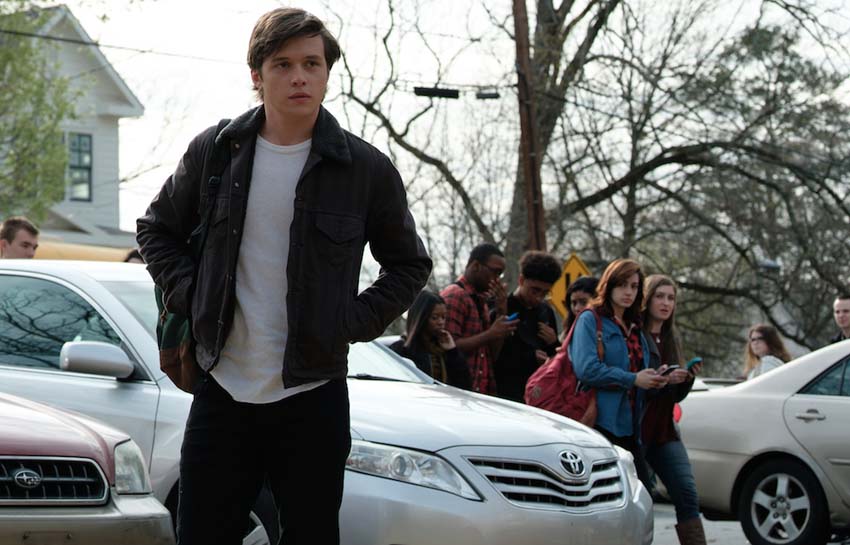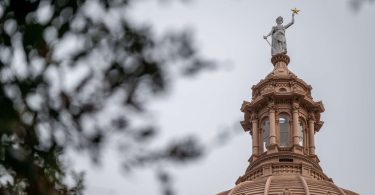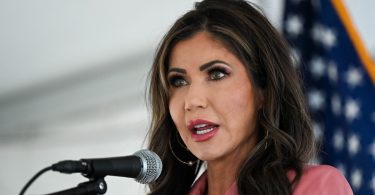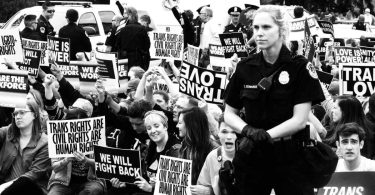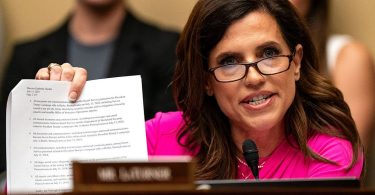At just 45, openly gay director Greg Berlanti is already a Hollywood veteran.
Since serving as writer-producer on 90s hit Dawson’s Creek, he’s worked for TV smashes Riverdale and Supergirl, while also helping write and produce blockbuster movies like Pan, Green Lantern and Wrath of the Titans.
Despite his impressive filmography, the husband of openly gay footballer Robbie Rogers (and dad to two-year-old Caleb) is experiencing something of a career peak right now. His new teen movie Love, Simon is a critical smash, currently scoring 92% on Rotten Tomatoes.
The adorable romcom, about a straight-acting 16-year-old accepting his gayness in modern day Atlanta, stars Jurassic World’s Nick Robinson [below] as Simon and 13 Reasons Why’s Katherine Langford as his best friend Leah.
Here, Greg talks making the movie in under a month, working with superstar actress Jennifer Garner and how his own coming out story compares to Simon’s. Warning, this article contains spoilers…
You shot the film in 30 days, which is crazy because it doesn’t seem rushed. How did you manage that?
I come out of TV, 30 days is a luxury! I had about four times as much time as I’m used to. In fact, we finished two days early. I used the money we saved for the soundtrack to buy songs. Sometimes, when you’re doing something a little quicker, as long as you’re well-planned, it gives a sense of energy. Especially comedy.
‘The executives at the studios were all straight – it demonstrates the power of allies’
It’s been reported that you were the only gay filmmaker on the project. Did you consult any other LGBTI people’s perspectives when making the film, or was it 100% your vision?
There were crew and other people who were LGBTI. But the writer of the book, the script and the producers and executives at the studios were all straight. They were the ones who were already committed to making the movie, which was wonderful. It demonstrates the power of allies. And then, it was me bringing my perspective, as it were.
Simon obviously knows what Grindr is, but doesn’t use it – or any service like it – in the film [It should also be pointed out that Simon is 16, while the age restriction for using Grindr in the US is 18]. Why did you make that decision, creatively?
I think he’s got enough annoying problems! You have to keep something for the sequel! [Laughs]
[embedded content]
Could there be a sequel?!
I said that jokingly… My point is he wasn’t really at… You know, it’s interesting. On a comprisable note, we had a section in there that was in the book, where his friend takes him to a gay bar. It just played as it wasn’t his character. That section of the movie sort of – the people in it were great, the moments were great – but it just slowed down the narrative. And it felt like we were jumping the gun about what his experience was.
‘God willing, people ask for a sequel’
As for a sequel or anything like that, you know… God willing that the movie is successful enough that people actually ask for something like that. What I’m focused on right now is that it does well enough that people get to hear other LGBT stories in mainstream media.
Well, I’d love to see a sequel. Look at all the terrible teen movies that have had sequels and franchises…
Well, thank you very much! I loved working with these people on this film so much. I would just like to spend more time with them, that would be good!
My favorite relationships in the film are between Simon and his mom, dad and sister. How did you make those dynamics so believable?
So much of it is casting. In that process, when Jennifer Garner got interested, we didn’t have the original scene that she has, that pushes Simon into act three. We had one ‘parent scene’, a scene with the dad.
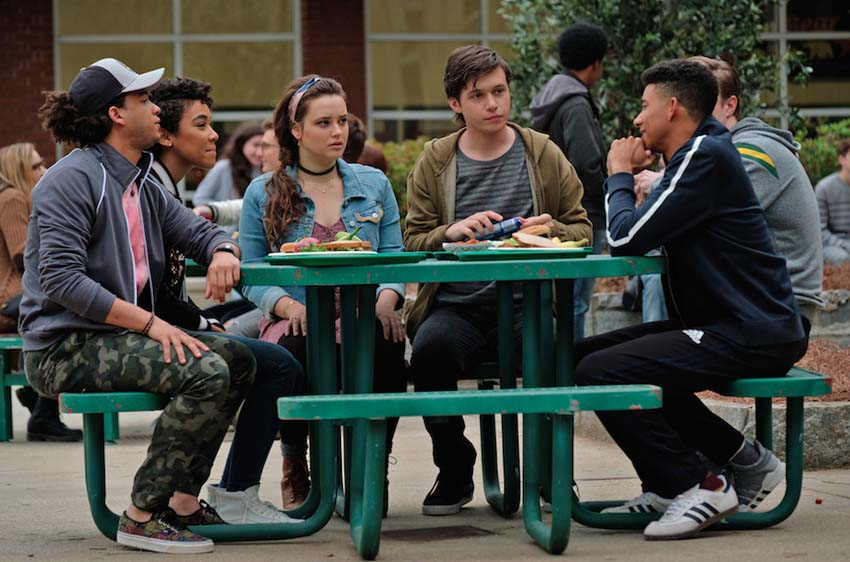
Jen said: ‘Look, I want to do this. But I want there to be a scene that has me connect with him.’ I said: ‘That’s our intention, we’ll have to build [it] again.’ I shared with the writers my own experience of coming out, and talked a lot about having these parent scenes in close proximity.
We wanted them to be as distinct and different as possible. I said to the writers: ‘The two most powerful things for me to hear after coming out’ – and it should have been self-evident, but I didn’t realize how powerful they were until I heard them – were ‘I still love you’ and ‘You deserve love.’ Those are different things.
The Jennifer Garner speech is essentially that. It’s the message of the movie. It’s so evocative and therapeutic for straight people, and specifically for LGBT people; the wish-fulfilment we’re used to seeing in other movies. Now, hopefully, it’s for us too.
‘Younger siblings don’t have our shame or biases’
It was great to see Simon talk about his sexuality with his infant sister. That never gets written about or depicted anywhere…
Yeah. Every kid is going through discovering who they are and having to figure that out and tell people, but it’s extra for LGBT kids. You worry: ‘How are people going to react?’ Are they still going to love you? Are they going to love you differently?’
I think not seeing portrayals or conversations about it between siblings, and particularly younger siblings… I think sometimes people presume young people can’t process that information. That’s absurd to me. In many ways, they don’t have our shame or biases.
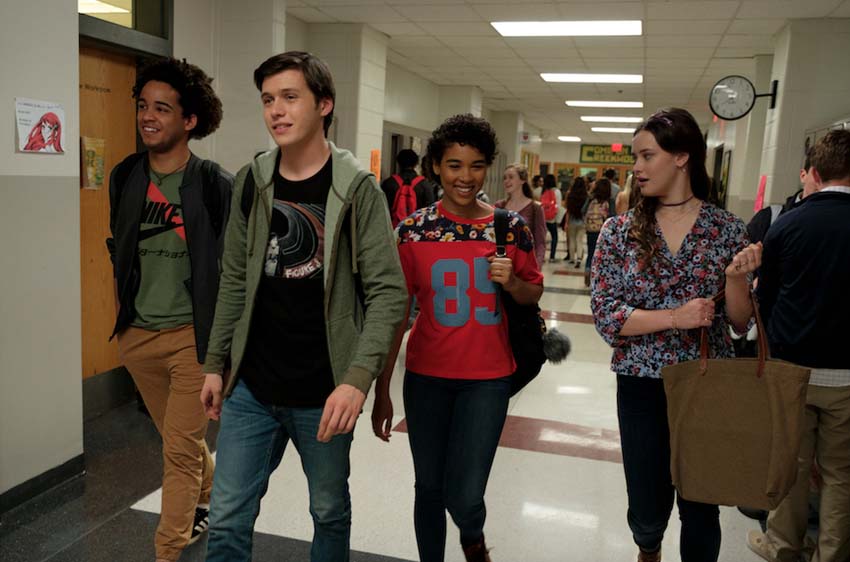
Simon’s dad refers to someone on TV as ‘fruity’. There’s also a moment where the mom admits she lost an ability to communicate with Simon at some point. Was it important to you to not depict the parents as perfect?
Yeah – I mean, they’re idealized in some ways: they’re Jen Garner and Josh Duhamel! They’re already pretty perfect! But we were talking to them about giving those characters arcs, to make those moments honest.
One of things we were really cognisant about was that Christmas morning scene. Without giving too much away, there’s a moment at the end where Jen wanted to go to the son. We talked a lot about that. I said ‘If you go now, the next scene won’t mean anything.’ The awkwardness of the moment – you can feel the audience when they watch it getting a little restless – it helps set up the later moment, and the connection.
‘I was in the theater program at college – you’d think I would’ve come out!’
The relationship, or character contrast, between Simon and his gay schoolmate Ethan was also great. Ethan perhaps wasn’t able to able to hide his sexuality, or didn’t want to. Was it important to also tell that character’s story?
It was. That wasn’t in the book or the original script. It was really important to me that there were other versions of the gay experience represented.
I remember when I was a closeted gay kid going to college, being in the theater program. You’d think I would’ve come out; there were all these kids around me. I remember thinking: ‘They’re so much more courageous than I am. Why can’t I have the courage to be myself?’
I thought that was an important element to bring to Simon. What it’s like on Simon’s side of it, and then the presumptions he makes about other people that are gay, even though he’s gay himself. And then you do all that, and you cast someone like Clark Moore, who brought so much to the part. As well as the writers had written it, Clark is Ethan. He brought himself to the role so beautifully.
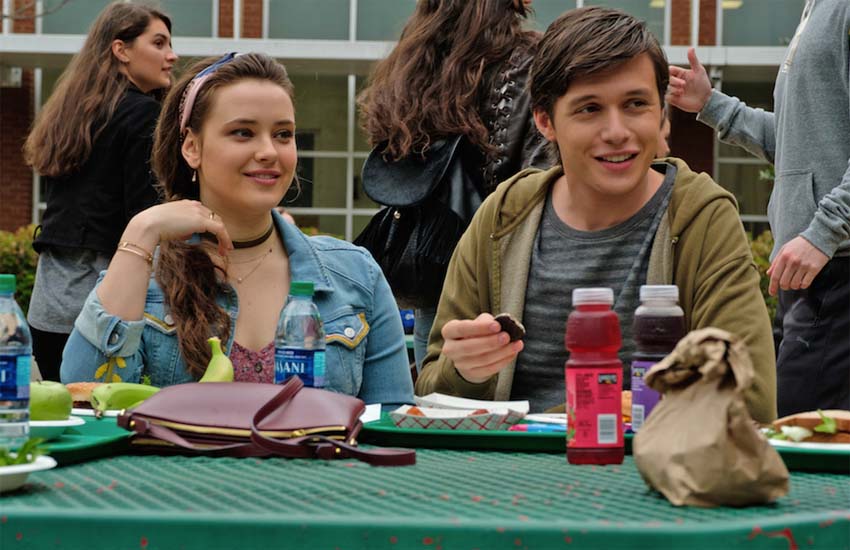
‘I’m impressed and proud of young people today’
Has there been a piece of feedback that’s meant the most?
Any stories I’ve heard from kids, whether online, Twitter, at some of the screenings. Some of those kids afterwards – trans individuals the other night, talking about their life experiences at 16, how this movie ‘made me feel more accepted’ – I’m always so impressed and proud of young people today. They’re in possession of more courage and worldliness than I had at that age. It blows me away.
Did you have a favorite film with an LGBTI character or plot when you were younger?
When I was a teenager it was more in shows and stuff. But the one I remember purchasing and hiding in college, not telling people I had was Longtime Companion, from 1989. I remember watching and re-watching that film, and how much it moved me.
I’ll look it up!
It’s devastating. There’s a moment at the end…it’s comparable to the bit at the end of Cinema Paradiso, that flips the switch on something.
There’s a moment at the end of Longtime Companion that captures, cinematically, the devastation of a whole generation to the AIDS crisis. I was coming of age while that was all sort of happening, so it made me feel a lot less alone at the time.
Love, Simon is out now in the US and the UK on the 16 April

